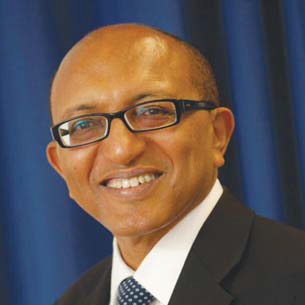TXF: This is the 30th anniversary year of CTA. How do you view the development of the agency so far and what do you feel about the direction you are taking CTA in at the present time?
Michael Hailu (MH): Over the years, CTA has built a strong network in the agricultural sector across Africa, Caribbean and the Pacific (ACP) countries. This has placed us in a very good position to facilitate dialogue and experience sharing among farmers’ groups, policy makers, researchers, extension agents, youth and women groups and the private sector. Such interactions help to break barriers and allow people to learn from each other. CTA has also been, and continues to be, a major provider of agricultural information to a large number of people in ACP countries.
Since 2011, CTA has undergone a major transformation as a result of our new strategic plan, which has re-focused our work on three priorities supporting the development and implementation of policies conducive to agriculture; promoting value chain development, including value chain finance; and building capacity in ICTs (information and communication technologies) and knowledge management. We also give specific attention to supporting youth and women in agriculture. I think CTA’s unique role is well recognised and appreciated by our partners and stakeholders, including the European Union and the ACP Group.
TXF: CTA is charged with attention to African, Caribbean Pacific (ACP) markets. How important is it to ensure you are working across the whole of the ACP spectrum?
MH: CTA is the only international institution deliberately working to connect Africa, Caribbean and the Pacific so that they can learn from each other in their efforts to transform the agricultural sector. Although these regions are far apart geographically, they face many similar challenges in their agriculture and fisheries sectors.
What has worked in one region can be replicated in another. For example, CTA is helping countries in the Pacific to develop their agro tourism by taking successful lessons from the Caribbean, which has good experience in this area. Africa can offer good lessons in mobile payments and other ICTbased services that Caribbean and Pacific countries can learn from. CTA helps by making the connections across the three regions.
TXF: Fin4Ag 2014 in Nairobi built on the success of the previous year in Kigali, how pleased are you as director with the way this year’s conference has panned out?
MH: I must say that Fin4Ag 2014 exceeded my expectations in several ways. First, the event attracted high level participants from government and the private sector.
Second, it brought people together from the financial and agricultural sectors – a revolution by itself as the Nigerian Minister of Agriculture noted at his keynote address.
Third, the discussions throughout the week were focused on solutions and possibilities rather than on problems, as many conferences of this kind usually tend to do.
Finally, I was pleased that many people came up to me individually and told me how they benefitted from the conference. One participant said he signed four contracts during the week and another noted that what he learnt at the conference was worth a full year’s course at university.
TXF: What major messages do you feel CTA is delivering through this major conference and how do you think those messages/initiatives are being received?
MH: For CTA, the major message is that transforming smallholder agriculture is key in achieving inclusive growth in ACP countries and it is critical that the financial sector is fully engaged if smallholder agriculture is to be transformed into a modern, profitable enterprise. We were pleased to see, for example, the seriousness with which the central bank governors who were present at the conference were considering supporting agriculture in their respective countries.
TXF: Going forward are there any new initiatives or changes in your operations that you plan to incorporate?
MH: There are a number of important messages that came out of the conference that we will move forward.
First, there were several financing models that work which were showcased at the conference. We will continue to provide a platform that will allow more people to know about these models so that they can be up-scaled.
Secondly, as I said earlier we have seen a great opportunity by bringing the financial sector together with the agricultural sector. We will do our best to support this interaction at different levels at the level of policy and of working capital and investment finance.
Third, the area of capacity building ie. building the knowhow of farmers in financial management and financiers in agriculture was identified as a priority. We will support initiatives to fill the gaps in this area.

